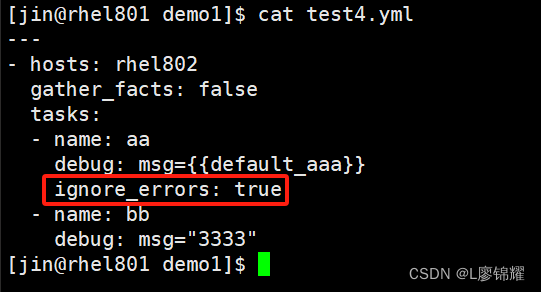Ansible的playbook脚本使用
本章注意介绍如何在ansible中写脚本
- playbook的语法
- 在写playbook时如何进行错误处理
ansible的许多模块都是在命令行中执行的,每次只能执行一个模块。如果需要执行多个模块,且要写判断语句,判断模块是否执行成功了,如果没成功会怎么处理等。这时就需要写脚本了,ansible中的脚本叫作 playbook,每个 playbook中可以包含多个play
1.1? playbook的写法
playbook是以yaml或yml作为后缀,每个play都可以使用两种格式来写
(1)参数写在模块后面
- name: play的名称
hosts:主机组1,主机组2,.... //列出主机
tasks:
- name:提示信息1
模块1:argx1=vx1 argz2=vx2 //这种写法,“=”两边不要有空格
- name: 提示信息x
模块x: rgx1=vx1 argx2=vx2 一个 play 中可以包含多个 tasks,每个 task调用一个模块
(2)参数分行写,一行一个参数
‐ hosts:主机组1,主机组2,... #‐‐列出主机组
tasks:
‐ name:描述语句1
模块1:
argxl: vxl #这里指定模块的参数,注意冒号后面的空格
argx2: vx2
‐ name:描述语句2
模块x:
argxl:vx1
argx2:vx2
需要注意的是,YAML文件对缩进有极严格的要求,每个缩进都是两个空格,不要按【Tab】键
一个完整的playbook中至少要包含一个 play,下面是一个包含两个play的playbook
‐‐‐
‐ name: 第一个play的名称
hosts: 主机组1,主机组2,...#‐‐列出主机组
tasks:
‐ name:提示信息1
模块1:argxl‐vxl argx2=vx2
‐ name:提示信息×
模块x:rgxl=vxl argx2=vx2
‐ name: 第二个play的名称
hosts: 主机组3,主机组4,...#‐‐列出主机组
gather facts: false
tasks:
‐ name: 提示信息1
模块1: argxl=vxl argx2=vx2
‐ name: 提示信息×
模块x: rgxl=vxl argx2=Vx2在写playbook时,一定要先写好框架,然后往框架中写内容。如果在多个主机组上做的是相同的操作,可以把它们放在同一个play中。如果在不同的主机组上做的是不同的操作,可以通过不同的play分别来实现
这里第二个play中加了一句gather_facts: false,意思是在执行此play时不需要通过setup获取主机组的信息。所以,如果在tasks中没有使用到fact变量,建议加上这句,可以提升执行的速度
写好之后运行playbook的方法是ansible playbook文件
本章实验都在/home/lduan/demol下操作,先把demo1目录创建出来并把 ansible.cfg 和hosts拷贝进去
[jin@rhel801 ~]$ mkdir demo1
[jin@rhel801 ~]$ cp ansible.cfg hosts demo1/
[jin@rhel801 ~]$ cd demo1/
[jin@rhel801 demo1]$ ls
ansible.cfg hosts
[jin@rhel801 demo1]$练习1:写一个playbook文件test1.yaml,在rhel802和rhel803上打印主机名和IP
分析:因为在server2和 server3上做的是相同的操作,所以只要一个play即可。这个play中包含两个task: 一个用于打印主机名,另一个用于打印IP
[jin@rhel801 demo1]$ cat test1.yml
---
- hosts: rhel802,rhel803
tasks:
- name: 打印主机名
debug: msg={{ansible_fqdn}}
- name: 打印IP地址
debug: msg={{ansible_default_ipv4.address}}
[jin@rhel801 demo1]$运行此playbook
[jin@rhel801 demo1]$ ansible-playbook test1.yml
PLAY [rhel802,rhel803] *********************************************************
TASK [Gathering Facts] *********************************************************
ok: [rhel802]
ok: [rhel803]
TASK [打印主机名] *******************************************************************
ok: [rhel802] => {
"msg": "rhel802"
}
ok: [rhel803] => {
"msg": "rhel803"
}
TASK [打印IP地址] ******************************************************************
ok: [rhel802] => {
"msg": "192.168.161.17"
}
ok: [rhel803] => {
"msg": "192.168.161.18"
}
PLAY RECAP *********************************************************************
rhel802 : ok=3 changed=0 unreachable=0 failed=0 skipped=0 rescued=0 ignored=0
rhel803 : ok=3 changed=0 unreachable=0 failed=0 skipped=0 rescued=0 ignored=0
[jin@rhel801 demo1]$练习2:写一个playbook文件test2.yaml,在rhel802上打印主机名,在rhel803上打印 IP。
分析:因为在rhel802和 rhel803上做的是不同的操作,所以这里写两个play,一个play在 rhel802上执行,另一个play在rhel803上执行。每个play中只要包含一个task即可
[jin@rhel801 demo1]$ cat test2.yml
---
- name: 在rhel802上的操作
hosts: rhel802
tasks:
- name: 打印主机名
debug: msg={{ansible_fqdn}}
- name: 在rhel803上的操作
hosts: rhel803
tasks:
- name: 打印IP地址
debug: msg={{ansible_default_ipv4.address}}
[jin@rhel801 demo1]$运行此playbook
[jin@rhel801 demo1]$ ansible-playbook test2.yml
PLAY [在rhel802上的操作] ************************************************************
TASK [Gathering Facts] *********************************************************
ok: [rhel802]
TASK [打印主机名] *******************************************************************
ok: [rhel802] => {
"msg": "rhel802"
}
PLAY [在rhel803上的操作] ************************************************************
TASK [Gathering Facts] *********************************************************
ok: [rhel803]
TASK [打印IP地址] ******************************************************************
ok: [rhel803] => {
"msg": "192.168.161.18"
}
PLAY RECAP *********************************************************************
rhel802 : ok=2 changed=0 unreachable=0 failed=0 skipped=0 rescued=0 ignored=0
rhel803 : ok=2 changed=0 unreachable=0 failed=0 skipped=0 rescued=0 ignored=0
[jin@rhel801 demo1]$练习3:写一个playbook 文件 test3.yaml,要求如下
(1)在rhel802上安装vsftpd,启动并开机自动启动vsftpd,设置防火墙开放ftp服务
(2)在rhel803上安装 httpd,启动并开机自动启动httpd,设置防火墙开放http服务
分析:因为在server2和 server3上做的是不同的操作,所以这里写两个play
第一个play在rhel80r2上执行,包含3个task,分别用于安装、服务管理、防火墙设置
第二个 play在rhel803上执行,包含3个task,分别用于安装、服务管理、防火墙设置
[jin@rhel801 demo1]$ cat test3.yml
---
- name: 在rhel802上要做的操作----安装vsftpd,启动服务,开启防火墙
hosts: rhel802
tasks:
- name: 第一个操作安装vsftpd
yum: name=vsftpd state=installed
- name: 第二个操作启动服务
service: name=vsftpd state=started enabled=yes
- name: 第三个操作开启防火墙
firewalld: service=ftp state=enabled immediate=yes permanent=yes
- name: 在rhel803上要做的操作----安装httpd,启动服务,开启防火墙
hosts: rhel803
tasks:
- name: 第一个操作安装httpd
yum: name=httpd state=installed
- name: 第二个操作启动服务
service: name=httpd state=started enabled=yes
- name: 第三个操作开启防火墙
firewalld: service=http state=enabled immediate=yes permanent=yes
[jin@rhel801 demo1]$运行此playbook?
[jin@rhel801 demo1]$ ansible-playbook test3.yml
PLAY [在rhel802上要做的操作----安装vsftpd,启动服务,开启防火墙] ***********************************
TASK [Gathering Facts] *********************************************************
ok: [rhel802]
TASK [第一个操作安装vsftpd] ***********************************************************
ok: [rhel802]
TASK [第二个操作启动服务] ***************************************************************
ok: [rhel802]
TASK [第三个操作开启防火墙] **************************************************************
ok: [rhel802]
PLAY [在rhel803上要做的操作----安装httpd,启动服务,开启防火墙] ************************************
TASK [Gathering Facts] *********************************************************
ok: [rhel803]
TASK [第一个操作安装httpd] ************************************************************
changed: [rhel803]
TASK [第二个操作启动服务] ***************************************************************
changed: [rhel803]
TASK [第三个操作开启防火墙] **************************************************************
changed: [rhel803]
PLAY RECAP *********************************************************************
rhel802 : ok=4 changed=0 unreachable=0 failed=0 skipped=0 rescued=0 ignored=0
rhel803 : ok=4 changed=3 unreachable=0 failed=0 skipped=0 rescued=0 ignored=0
[jin@rhel801 demo1]$ 1.2 错误处理
在写playbook时,会遇到各种各样的问题,例如,命令出错了,或者引用的变量不存在等。playbook具备一定的错误处理能力
1.2.1 ignore_errors
执行一个playbook时,如果其中的某个task出错,则后续的task就不再继续执行了。看 下面的例子,编写test4.yaml的内容如下
[jin@rhel801 demo1]$ cat test4.yml
---
- hosts: rhel802
gather_facts: false
tasks:
- name: aa
debug: msg={{default_aaa}}
- name: bb
debug: msg="3333"
[jin@rhel801 demo1]$?这里写了两个task,一个是aa,另一个是bb,aa这个 task 中引用了一个不存在的变量 default_aaa,所以导致aa这个task报错。如果某个task出错,则后续的task就不再继续执行了,所以bb这个 task不会继续执行了
[jin@rhel801 demo1]$ ansible-playbook test4.yml
PLAY [rhel802] *****************************************************************
TASK [aa] **********************************************************************
fatal: [rhel802]: FAILED! => {"msg": "The task includes an option with an undefined variable. The error was: 'default_aaa' is undefined\n\nThe error appears to be in '/home/jin/demo1/test4.yml': line 5, column 5, but may\nbe elsewhere in the file depending on the exact syntax problem.\n\nThe offending line appears to be:\n\n tasks:\n - name: aa\n ^ here\n"}
PLAY RECAP *********************************************************************
rhel802 : ok=0 changed=0 unreachable=0 failed=1 skipped=0 rescued=0 ignored=0
[jin@rhel801 demo1]$?如果想让task aa出错时不影响后续task的执行,那么可以在task aa中添加 ignore_errors:true来忽略这个报错继续往下执行

?这里添加了ignore_errors:true忽略报错信息。下面运行test4.yaml查看结果
[jin@rhel801 demo1]$ ansible-playbook test4.yml
PLAY [rhel802] *****************************************************************
TASK [aa] **********************************************************************
fatal: [rhel802]: FAILED! => {"msg": "The task includes an option with an undefined variable. The error was: 'default_aaa' is undefined\n\nThe error appears to be in '/home/jin/demo1/test4.yml': line 5, column 5, but may\nbe elsewhere in the file depending on the exact syntax problem.\n\nThe offending line appears to be:\n\n tasks:\n - name: aa\n ^ here\n"}
...ignoring
TASK [bb] **********************************************************************
ok: [rhel802] => {
"msg": "3333"
}
PLAY RECAP *********************************************************************
rhel802 : ok=2 changed=0 unreachable=0 failed=0 skipped=0 rescued=0 ignored=1
[jin@rhel801 demo1]$可以看到,即使task aa出错了,但是后续的 task bb仍然继续执行
1.2.2 fail语句
fail模块和debug模块一样,都是用来打印信息的,区别在于debug执行完成之后会继续进行后续模块的操作,而fail打印完报错信息之后会退出整个playbook。编写test5.yaml的内容如下
[jin@rhel801 demo1]$ cat test5.yml
---
- hosts: rhel802
gather_facts: false
tasks:
- name: aa
debug: msg="111"
- name: bb
fail: msg="222"
- name: cc
debug: msg="333"
[jin@rhel801 demo1]$ 这里写了3个task,其中task aa和 task cc使用debug打印信息, task bb使用fail打印信息。下面运行此playbook查看结果,如下所示
[jin@rhel801 demo1]$ ansible-playbook test5.yml
PLAY [rhel802] *****************************************************************
TASK [aa] **********************************************************************
ok: [rhel802] => {
"msg": "111"
}
TASK [bb] **********************************************************************
fatal: [rhel802]: FAILED! => {"changed": false, "msg": "222"}
PLAY RECAP *********************************************************************
rhel802 : ok=1 changed=0 unreachable=0 failed=1 skipped=0 rescued=0 ignored=0
[jin@rhel801 demo1]$可以看到,task aa正确执行之后,继续执行task bb。因为 task bb用的是fail来打印信, 所以执行完成之后就退出 playbook了,task cc并没有执行
本文来自互联网用户投稿,该文观点仅代表作者本人,不代表本站立场。本站仅提供信息存储空间服务,不拥有所有权,不承担相关法律责任。 如若内容造成侵权/违法违规/事实不符,请联系我的编程经验分享网邮箱:chenni525@qq.com进行投诉反馈,一经查实,立即删除!
- Python教程
- 深入理解 MySQL 中的 HAVING 关键字和聚合函数
- Qt之QChar编码(1)
- MyBatis入门基础篇
- 用Python脚本实现FFmpeg批量转换
- HelloWorld(java)
- 原生JS和jQuery请求接口
- kylin4.0.3升级问题
- android:persistent和android:priority的区别,对进程优先级有什么影响?
- 2024年【陕西省安全员C证】考试总结及陕西省安全员C证复审考试
- 【模拟电路】软件Circuit JS
- 淘宝商品数据采集订单数据采集店铺数据采集API演示
- js逆向第18例:猿人学第15题备周则意怠-常见则不疑
- Stable Diffusion初体验
- docker 安装mysql容器